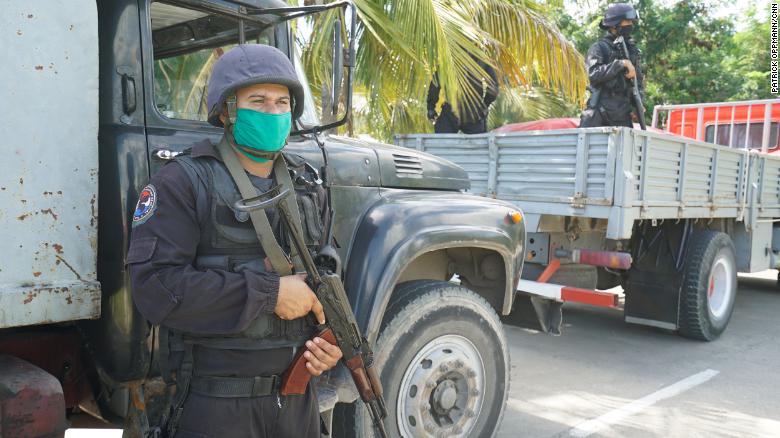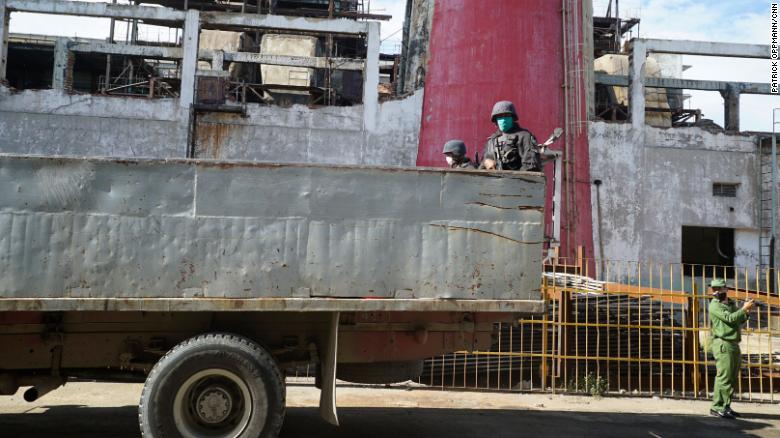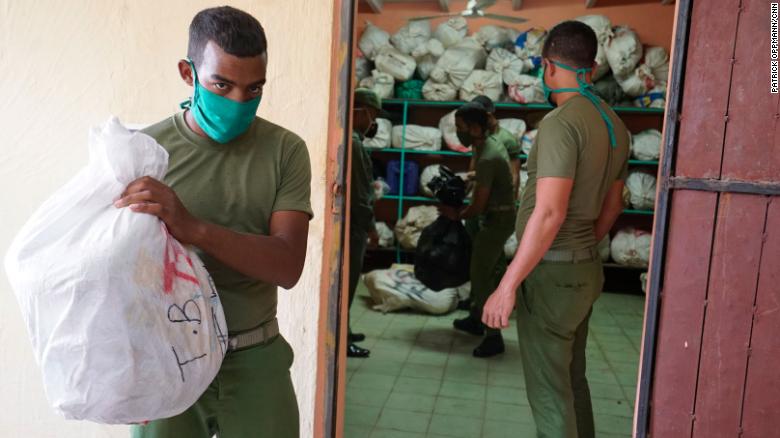The smaller boat’s load lightened, and it escaped into the darkness heading north. But the Cuban cutter recovered 1,618 kilos of abandoned marijuana floating in the ocean, according to Cuban officials who described the incident to CNN.
Seven days later, the Cuban coast guard chased down a different smuggling boat and arrested two Bahamians and a Jamaican citizen with more than 730 kilos of marijuana on board.
Despite severe penalties for traffickers who are caught transporting drugs through the island’s waters, Cuban officials say they are experiencing a surge of over 50% in smuggling runs so far this year, relative to the same period the previous year.
Although the drug boats are skirting through Cuban waters, Cuba is rarely their destination, since the domestic market for drugs is small and penalties for even small illegal drug possession are harsh. The boats are heading to the US but often come close to Cuba on that journey.
So far in 2020, Cuban officials have seized or recovered nearly 4 tons of drugs from numerous vessels. It’s usually marijuana, but occasionally hashish and cocaine as well, which marks a “significant increase” from 2019, said Col. Osmar Hernandez de la O, the official in charge of the Cuban Border Guard for the southern end of Cuba. This region includes the Windward Passage, historically a favoured route for smugglers trying to bring contraband through the Caribbean to the US.
The increased smuggling is a prime example of what has come of deteriorating US-Cuban relations hitting
their lowest point in decades, after a short-lived burst of rapprochement during the Obama years.
The trend, US and Cuban officials say, has left the country less equipped to combat drug smuggling, human trafficking and counter-terrorism between Cuba and the US, due to severed ties between Cuban and US law enforcement.
The Trump administration has thwarted cooperation with Cuba, said Hernandez de la O. But if that cooperation returns, “we can stop the boats and lessen the effects of the drugs entering the US.”

Cuban special forces troops oversee official efforts to stamp out drug trafficking headed to the US.
Ties began to deteriorate in 2017
when the Trump administration not only levied punishing economic sanctions on the communist-run government but curtailed permission for US citizens to travel to the island.
The administration also effectively ended legal remittances sent from Cuban-Americans back to family members in Cuba and cancelled a wide array of other Obama-era policies, including allowing US cruise ships to visit the island and Major League Baseball to recruit Cuban players.
As the incoming Biden administration and Cuban government look at how to reengage following four years of Cold War-era acrimony, cooperation on law enforcement again could be a logical first step, officials in both countries said.
‘A jumping-off point’
In 2017, in the final days of the Obama presidency, the US and Cuba signed a law enforcement agreement that for the first time created a legal framework for the two neighbouring countries to work together on issues like drug smuggling, human trafficking and counter-terrorism.
Ben Rhodes, Obama’s then-Deputy National Security Adviser who had led the secret negotiations with Havana to open the way to normalizing relations, flew to Havana for the signing ceremony.
“It was clearly in our interest to have a cooperative relationship with a country 90 miles from Florida,” Rhodes told CNN. Cuba “had its own robust counter-narcotics capabilities and also serves as a jumping-off point for migration to the US or smuggling efforts.”
Up until then, communication on drug smuggling was limited to when Cuban officials alerted the Coast Guard in Miami to suspicious boats they observed heading north or messages transmitted via the one US Coast Guard liaison officer stationed at the US Embassy in Havana.
Following the signing of the agreement, Cuban and US law enforcement agencies said they had three different meetings where, for the first time, members of different agencies had the ability to share strategies and intelligence in person on threats that impacted both sides of the Florida Straits.

Cuban military cadets at a military base just outside Santiago de Cuba haul contraband marijuana.
“Trump’s hostile policies have marked a setback in relations,” said Lt. Col. Imandra Oceguera Coll, a Cuban Border Guard official who took part in meetings with US counterparts and said that the abrupt end to the cooperation prevented US and Cuban law enforcement from carrying out plans to increase security between the two countries.
Despite this policy, she said, “Cuba is willing to combat international drug trafficking. We have stopped tons of drugs from reaching the US.”
The Trump administration did not respond to CNN’s request for comment about the law enforcement cooperation’s abrupt end. During the US presidential election, Trump courted the heavily conservative Cuban-American community in Florida and touted his cancelling of “the Obama-Biden sellout to the Castro regime.”
Drug trafficking’s a long game
For years, critics of the Cuban government have contended that the communist-run island has links to drug trafficking, pointing to a still murky affair from 1989 when a Cuban army general with close ties to then-President Fidel Castro and his younger brother and then-Defense Minister Raul Castro, along with a handful of other officials, were put on public trial for smuggling and later executed.
More recently,
critics say Cuba’s key support for embattled Venezuelan leader Nicolas Maduro, who has been indicted by the US on drug trafficking charges, likely means Havana has at the very least looked the other way about Venezuelan officials’ alleged smuggling operations.
Maduro and other top Venezuelan officials have dismissed the trafficking charges as part of a larger US effort to overthrow their socialist government. Cuban officials have also denied they are involved in drug trafficking in Venezuela, or anywhere else.
But while the State Department under the Trump administration waged a campaign against imports of Cuban rum, tobacco and even, during the height of the pandemic, Cuban government doctors working abroad, US officials have quietly acknowledged that Cuba cooperates when it comes to counter-narcotics.
“Cuba is not a major consumer, producer, or transit point of illicit drugs,” read the US State Department’s 2020 International Narcotics Control Strategy Report. “Cuba dedicates significant resources to prevent illicit drugs and their use from spreading, and regional traffickers typically avoid Cuba.”
Before Trump’s shift on Cuba, the cooperation between the two countries went both ways. Under the Obama administration, Cuban officials told CNN they were working with US law enforcement to identify criminal groups in Miami smuggling drugs by commercial flights to Cuba, mostly pills like ecstasy and synthetic marijuana, which are rare narcotics that demand high prices on the island.
“The stability that we have, the capable forces we have in the law enforcement community is not only a guarantee for the national security of Cuba but it’s also beneficial for the national security of the United States,” said Yuri Gala López, a Cuban Foreign Ministry official.
Gala López said the Cuban government is intent on recultivating the US connections forged during the Obama years, which Biden’s campaign also stressed, partly as a way to help mediate with Venezuela, Cuba’s socialist ally.
The road to rapprochement
To demonstrate the rise in trafficking, Cuban officials in October invited CNN to see what they do with the drugs they capture.
On a military base on the outskirts of Santiago de Cuba, Cuba’s second-largest city, officials opened a room where seized drugs are held behind two padlocks and two seals. The keys and seals belong to different Cuban law enforcement agencies and an armed guard stood outside.
“It’s impossible for anyone person to gain access to this room,” said Maj. Hermes Garcia Lauzao, a criminal investigator with the Interior Ministry. The room, from floor to ceiling, was packed with illegal drugs recovered by law enforcement.
Bag by bag, young military cadets hauled nearly 3 tons of contraband marijuana into two large flatbed dump trucks. Some of the drugs were stuffed into rice sacks, others bursting from the seams of suitcases.

A sealed, padlocked and heavily guarded room brimming with drugs seized by Cuban officials.
Watching each load come out of the room were a half dozen Cuban special forces troops, all dressed in black, some carrying automatic weapons, others cradling shotguns. With the soldiers riding on top of the trucks, a line of police and military vehicles sped through the streets of Santiago, where residents pointed and gawked at the unusual convoy.
At their destination, a thermoelectric plant, a crane hoisted the drugs to the roof to incinerate them in an industrial furnace that Cuban officials say burns at over 1,700 degrees Celsius.
“This all could have ended up in the US,” says Garcia Lauzao, as the bags emptied into the furnace where they glowed bright red and gave off thick smoke and an unmistakable odour.
It is a point that Cuban officials hope to get across to the incoming US administration in Washington.
(CNN)


